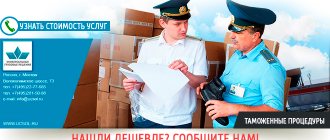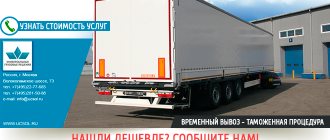Eurasian Economic Commission
Article 162. Place and time of departure of goods from the customs territory of the Customs Union1. The departure of goods from the customs territory of the Customs Union is carried out at the places of movement of goods across the customs border (hereinafter referred to as the place of departure) and during the work of customs authorities in these places.
Certain categories of goods may depart from the customs territory of the customs union only at points of departure determined by the legislation of the member states of the customs union.
Goods may leave the customs territory of the customs union in other places that are not places of departure, in cases and in the manner determined by the legislation of the member states of the customs union.
The list of places of departure is sent by customs authorities to the Customs Union Commission for publication, including using information technology.
2. Customs authorities are required to provide information about places of departure, established restrictions and operating hours of customs authorities, including using information technology.
3. The provisions of this chapter do not apply to goods transported by water or aircraft crossing the customs territory of the Customs Union without stopping at a port or airport, which are located in the customs territory of the Customs Union, as well as to goods transported by pipeline transport and along power lines.
Article 163. Customs operations performed at places of departure
1. For the departure of goods from the customs territory of the Customs Union, the carrier is obliged to submit to the customs authority a customs declaration or another document allowing their export from the customs territory of the Customs Union, as well as documents and information provided for in Article 159 of this Code, depending on the type of transport on which goods are transported unless otherwise established by this Code.
Regardless of the type of transport used for transportation, for the departure of goods from the customs territory of the Customs Union, documents confirming compliance with prohibitions and restrictions are submitted to the customs authority in accordance with paragraph 1 of Article 152 of this Code.
A customs declaration or other document allowing the export of goods from the customs territory of the Customs Union is not submitted for the departure of goods from the customs territory of the Customs Union if these goods, after arriving at the customs territory of the Customs Union, did not leave the place of movement of goods across the customs border.
2. The carrier has the right to submit documents in the form of electronic documents.
3. On behalf of the carrier, documents may be submitted by a customs representative or other persons acting on behalf of the carrier, if this is permitted in accordance with the legislation of the member states of the customs union.
4. The departure of goods from the customs territory of the customs union is permitted with the permission of the customs authority.
Permission from the customs authority for the departure of goods from the customs territory of the Customs Union is issued by affixing the corresponding marks of the customs authority on the customs declaration or other document allowing their export from the customs territory of the Customs Union, and on transport (transportation) documents.
Article 164. Requirements for goods upon their departure from the customs territory of the Customs Union
1. Goods must be actually exported from the customs territory of the customs union in the same quantity and condition in which they were at the time of their placement under a certain customs procedure or at the time of arrival in the customs territory of the customs union, if these goods did not leave the place of movement of goods through customs border, except for the cases established by part two of this paragraph.
Changes in the quantity and (or) condition of the goods specified in part one of this paragraph are allowed due to natural wear and tear or loss or due to changes in the natural properties of the goods under normal conditions of transportation, transportation and storage, as well as changes in the quantity of goods due to the presence of non-drainable residues in the vehicle.
2. Persons are not responsible for failure to comply with the provisions of this article if the loss or change in the condition of goods occurred as a result of an accident or force majeure, and in cases provided for by technical regulations and standards in force in the member states of the customs union - if information about quantity of goods due to errors in measurement methods.
3. Goods of the customs union may be exported from the customs territory of the customs union in quantities less than the quantity declared when they were placed under a certain customs procedure, regardless of the reasons why the quantity of goods decreased.
Article 165. Measures taken in the event of an accident, force majeure or other circumstances
1. If the delivery of goods from the place of departure to the place of actual crossing of the customs border is interrupted due to an accident, force majeure or other circumstances preventing such delivery of goods, the carrier is obliged to take all measures to ensure the safety of the goods, immediately notify the nearest customs authority about these circumstances and about the location of the goods, as well as transport the goods or ensure their transportation (if their vehicle for international transportation is damaged) to the nearest customs authority or another place specified by the customs authority.
2. Expenses incurred by carriers or other persons in connection with compliance with the requirements of this article shall not be reimbursed by customs authorities.
Article 166. Origin and termination of the obligation to pay import customs duties, taxes and the deadline for their payment upon departure of foreign goods from the customs territory of the Customs Union
1. When foreign goods depart from the customs territory of the Customs Union, the obligation to pay import customs duties and taxes arises on the carrier from the moment the customs authority issues permission for the departure of goods from the customs territory of the Customs Union.
2. The carrier’s obligation to pay import customs duties and taxes upon departure of foreign goods from the customs territory of the Customs Union is terminated:
1) when goods actually cross the customs border;
2) in cases established by paragraph 2 of Article 80 of this Code.
3. Upon departure of foreign goods from the customs territory of the Customs Union due for the payment of import customs duties and taxes, if before the actual crossing of the customs border the goods were lost, with the exception of destruction (irretrievable loss) due to an accident or force majeure or as a result of natural loss under normal conditions transportation (transportation) and storage, the day of loss of goods is considered, and if this day is not established, the day the customs authority issues permission for the departure of goods from the customs territory of the Customs Union.
4. Import customs duties and taxes are subject to payment in amounts corresponding to the amounts of import customs duties and taxes that would be payable when placing goods under the customs procedure of release for domestic consumption, calculated based on the rates of customs duties, taxes of customs value, their physical characteristics in in kind (quantity, weight, volume or other characteristic) and the exchange rate established in accordance with the legislation of the member state of the customs union to which customs duties, taxes are payable, and those in force on the day of loss of goods, and if this day is not established, – on the day the customs authority issues permission for the departure of goods from the customs territory.
Where and in what form to submit documents
It is necessary to submit documents to confirm zero VAT to the tax office at the place of registration of the legal entity - this can be done on paper or in the form of electronic registers through the electronic document management (EDF) operator system.
As a rule, a paper package of documents to confirm 0% VAT is used by small companies that have 10–30 deliveries of goods during the year. And large participants in foreign trade activities that move goods in large volumes submit electronic registers to the Federal Tax Service.
What documents need to be submitted
- If you submit documents on paper, you must submit to the tax office (Article 165 of the Tax Code of the Russian Federation):
- Contract for the supply of goods (or a copy thereof). If the contract has already been submitted to the tax authority, then there is no need to send it again. It is enough to send a notification with the details of the previously submitted document and the name of the tax authority to which it was submitted.
- A customs declaration (or a copy thereof) with a mark from the customs authority on the release of goods and a mark on the actual export of goods from the territory of the Russian Federation.
Until 2021, the exporter also had to submit to the Federal Tax Service copies of transport or shipping documents with a mark from the customs authority on the export of goods. Now these documents are submitted only upon request from the tax authorities.
- If you submit documents electronically through the EDI system, then you need to send to the tax office:
- Electronic register of customs declaration.
"The goods have been exported"
As for o, it must be obtained in the form of an original stamp only if the exporting company will submit documents confirming zero VAT to the tax office on paper.
The stamp is affixed to the customs declaration and transport document by the customs authority at the border crossing point. At the same time, the inspector enters information about the export of goods into the database of the Federal Customs Service of Russia and then this information is transferred to the Federal Tax Service for control (clause 17 of Article 165 of the Tax Code of the Russian Federation).
If the stamp was not affixed at the checkpoint, then confirmation of the fact of export can be obtained from the customs office where the goods were declared. To do this, you must submit an application to the customs post, which is drawn up in any form, and the following must be indicated:
- registration number of the goods declaration, which requires confirmation of the fact of export;
- serial number and description of the product;
- code of the customs authority of the place of departure.
The application can be submitted either in paper or electronic form. Within 10 days, the customs authority will send the declarant information about the actual export of goods in the same way - in writing or electronically.
If an exporting company submits electronic registers to the tax office, then it is not required on customs documents - neither in the form of information, nor in the form of an original stamp (Clause 15 of Article 165 of the Tax Code of the Russian Federation). However, to prepare the register, information on the date of actual export of goods will be required. They can be obtained through your personal account on the FCS portal using the information service “Information about the export of goods.”
How to respond to a tax demand after submitting documents
The tax inspectorate may request documents in the following cases (clause 1.2 of Article 165 of the Tax Code of the Russian Federation):
- if the information provided by the taxpayer does not correspond to what the tax authority has;
- if the Federal Tax Service does not have information that the Federal Customs Service transmits as part of departmental exchange.
If, based on the results of the reconciliation, the tax office has requested a transport document, the exporter must submit a paper invoice with the original “Goods Exported” stamp.
If the tax office has requested a declaration from an exporter who used an electronic register to confirm zero VAT, then it is enough for him to submit a copy of the electronic customs declaration, printed from his software, with customs information about the release of goods (in the future, put the “Release permitted” stamp on this copy of the EDT no need). At the same time, the “Goods exported” stamp on a paper copy is not required (clause 15 of Article 165 of the Tax Code of the Russian Federation) - this has been permitted since October 2021 by amendments to Federal Law dated August 3, 2018 No. 302-FZ in the provisions of Art. 165 Tax Code of the Russian Federation.









